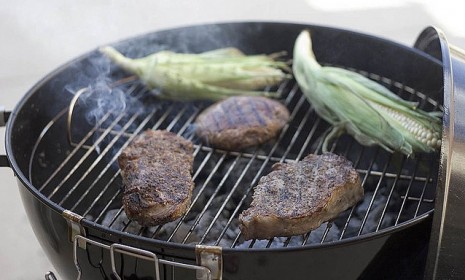Are barbecue grills destroying the planet?
This weekend, America's outdoor cooks will fire up their grills and launch the summer barbecue season. How bad is all that burning charcoal for the environment?

A free daily email with the biggest news stories of the day – and the best features from TheWeek.com
You are now subscribed
Your newsletter sign-up was successful
Memorial Day weekend marks the unofficial kickoff of the summer barbecue season. Three-quarters of American households own a grill of some kind, and when the season peaks on the Fourth of July, 60 million barbecues will be fired up across the country on a single day — consuming an awful lot of charcoal and lighter fluid. Is our grilling ritual disastrous for the environment?
Yes, grilling is very eco-unfriendly: On July 4 alone, Americans will burn enough energy "in the form of charcoal, lighter fluid, gas, and electricity to power 20,000 households for a year," says Stacy Irwin at Green Earth News. That spells trouble for the planet. But it's easy to mitigate the damage. Just switch from a dirty charcoal grill to propane or electric, or, "if you're really dedicated," a solar oven.
"Eco-friendly barbecue: How to green your grill!"
The Week
Escape your echo chamber. Get the facts behind the news, plus analysis from multiple perspectives.

Sign up for The Week's Free Newsletters
From our morning news briefing to a weekly Good News Newsletter, get the best of The Week delivered directly to your inbox.
From our morning news briefing to a weekly Good News Newsletter, get the best of The Week delivered directly to your inbox.
Wait, not all charcoal harms the environment: OK, so gas grills burn cleaner, says Kim Lemmonds at Elliott City Patch. But electric grills are no solution, as most of that power comes from burning fossil fuels. Besides, not all charcoal is alike. If more people bought natural wood charcoal made from sustainably harvested trees, and avoided using lighter fluids or briquets infused with self-lighting petroleum products, the pollution that comes with barbecue season would shrink dramatically.
"BBQ season brings choices to the eco-friendly consumer"
Consequences be damned... grill, baby, grill: Don't be swayed by the arguments you hear in favor of gas grills, says Josh Ozersky at TIME. Gas grills are "a perversion and a corruption." They are "Soylent Green." They are evil contraptions designed to cook meat fast and rob it of its crust, woodsy taste, and succulent fat. So fire up the charcoal. Cooking outdoors, over glowing hardwood embers, is "a rite of spring, an affirmation of our status as citizens of the land of plenty, free to eat and drink the sunny uplands of human freedom."
"Barbecuers, unite! Why gas grills are evil"
A free daily email with the biggest news stories of the day – and the best features from TheWeek.com